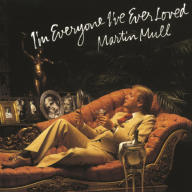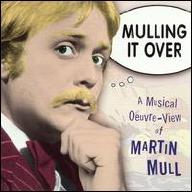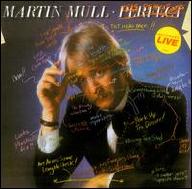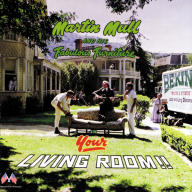Mull was born in Chicago in 1943. Somewhat surprisingly given his later success as a performing artist, Mull originally trained to be a painter. After receiving a master's degree from the Rhode Island School of Design in 1967 and studying in Italy, Mull settled in the Boston area and became involved in the local improvisational comedy and folk music scenes to supplement his income while continuing his painting career. Eventually forming a full band called Martin Mull and His Fabulous Furniture (which at one point included future Cars keyboardist Greg Hawkes), Mull signed to the fledgling Capricorn label in 1972; his self-titled debut was one of the imprint's first releases. Although Martin Mull is an excellent album nestled somewhere between Warren Zevon and Leon Redbone, widespread commercial success seemed unlikely. A live album called Martin Mull and His Fabulous Furniture in Your Living Room!! showed that the idiosyncratic performer was developing quite the cult following, based on the enthusiastic audience at this gig. The live album also provides an outlet for Mull's standup comedy skills, as some of the song introductions go on longer than the songs themselves.
Mull released two more albums on Capricorn, 1973's Normal, and 1974's Days of Wine and Neurosis, which broke little new ground commercially but refined his style. His music was becoming considerably more jazz-based -- much of Days of Wine and Neurosis has a definite Fats Waller feel -- and his lyrics more bizarre and cutting. Unfortunately, his sales remained minimal, and Capricorn dropped him, only to release the compilation No Hits, Four Errors: The Best of Martin Mull, following his television success.
Just after a one-off album on Vanguard, 1975's stripped-down In the Soop, Mull's career took a much different turn when he was hired as wife-beating villain Garth Gimble on Norman Lear's satirical soap opera #Mary Hartman, Mary Hartman. Although Mull's character was quickly killed off -- speared to death on a Christmas tree -- he was popular enough that Lear created a spin-off for Mull, a deadpan parody of local TV talk shows called #Fernwood 2-Night, starring Mull as smarmy Barth Gimble and Fred Willard as his dense co-host. The show was never more than a cult favorite, but it was popular enough to get Mull a new recording deal with ABC Records. 1977's I'm Everyone I Ever Loved basically picks up where Days of Wine and Neurosis left off, but 1978's Sex and Violins is a full-fledged orchestral album in the tradition of Frank Sinatra's albums with Nelson Riddle, arranged and produced by Frank DeVol, a noted composer of television themes who played bandleader Happy Kyne on #Fernwood 2-Night. Although the entire enterprise is dripping with irony, from Harry Shearer's opening remarks as an ABC Records spokesman onwards, there's also an obvious love of the style on display.
ABC Records imploded not long after the release of Sex and Violins, and Mull signed to Elektra for what would prove to be his final album, 1979's Near Perfect/Perfect. A return to the low-key pop/rock style of his first two records, it's also the most overtly comedic of Mull's albums. After this, Mull returned to his first love, painting, scoring numerous one-man shows at museums around the world, supplementing his work with medium-profile television acting and writing gigs. In 1998, Rhino released the two-disc set Mulling It Over, collecting the best material from Mull's four Capricorn albums. ~ Stewart Mason, Rovi
|
1
|
|
Men |
|
2
|
|
Santafly |
|
3
|
|
Dancing in the Nude |
















